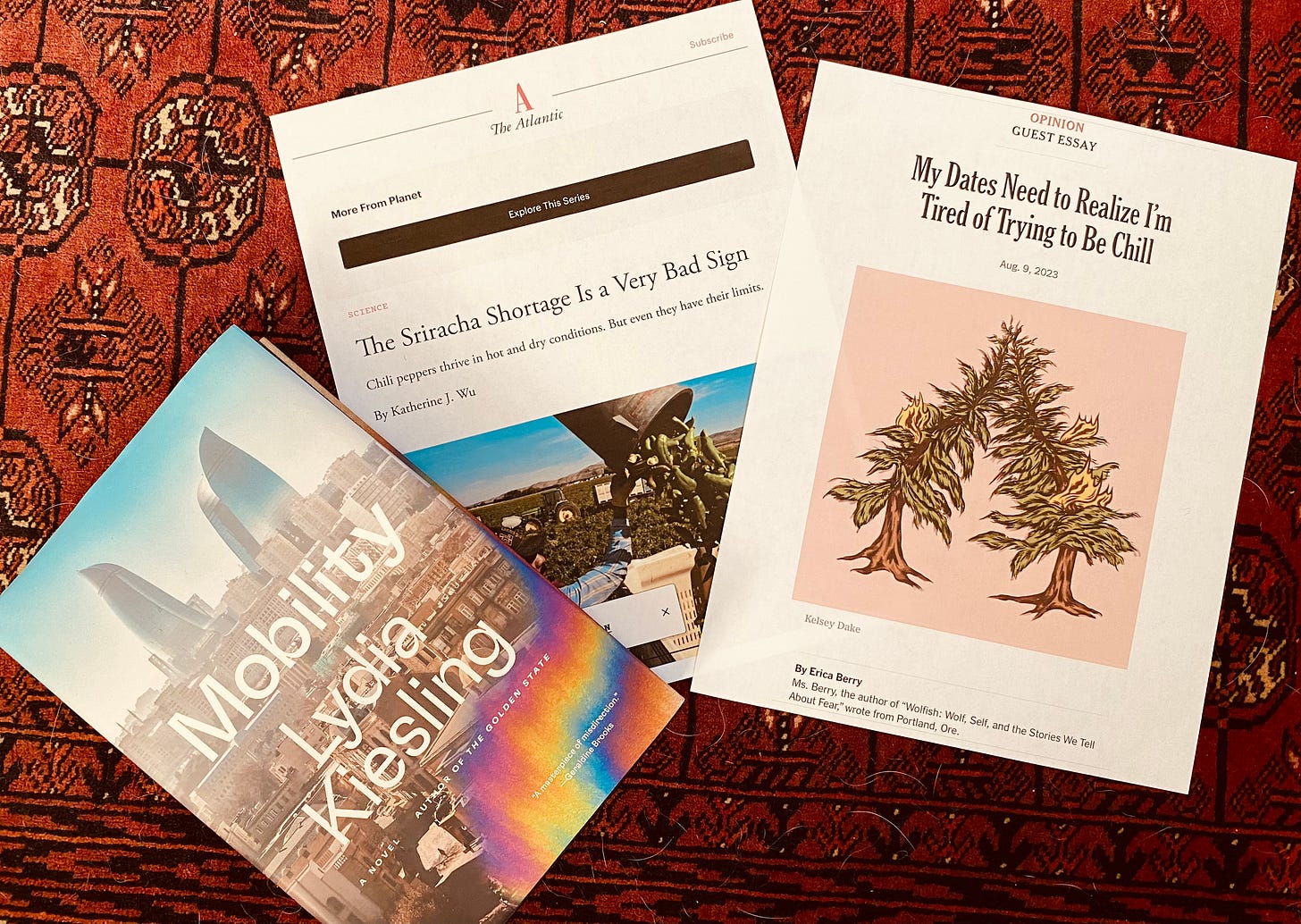Some Climate Reads for You
My latest, favorite climate reading recommendations
As you read this, I will be wandering the streets of Stockholm, Sweden after an incredible Do the North kayaking-culinary adventure with my friend Lindsey who has been along this whole Cramming journey with me from the very beginning. I will, of course, eventually write about this experience after it happens. And you can (and should) follow my adventures in real-time on Instagram.
What this also means is that if any big climate news happens (which, honestly, how this summer has gone seems likely), I’m not going to be writing about it because this actual post was written well before I left the country. Alas, I’m not a news-breaker of any sorts and given the state of the climate crisis, there’s no way one could address every single thing that happens in the climate news.
In the meantime, I thought that you all would enjoy a little rundown of my latest climate reads. Because of this project, my amazing friends and readers send me relevant articles they’ve been reading and I pick up just about any new book that addresses climate change. So now, here are three things I’ve read recently that you should, too.
My Dates Need to Realize I’m Tired of Trying to Be Chill by Erica Berry (The New York Times)
Erica Berry’s New York Times opinion piece about centering her climate concern while dating was incredibly resonant for me. If anything it’s because she’s from Portland and mentions the very events of the last few years that bring me so much climate anxiety. While I am not on the dating scene and effectively chose “my person” over a decade ago and we are still happily married and raising an offspring together, it has made me wonder how climate change would make me approach dating in the mindset I am now. It also makes me feel somewhat flabbergasted at past me for not approaching the topic of taking-climate-seriously to the same level as I held wants-kids in my estimation for my potential mate.
I got lucky. I ended up with a person who very much takes climate seriously and gets (and sometimes shares) in my fear about it. But if I didn’t, y’all, that would be a deal breaker. Someone who doesn’t take climate change seriously is the ultimate red flag. And I love that Berry voices that in her very personal way.
The Sriracha Shortage Is a Very Bad Sign by Katherine J. Wu (The Atlantic)
Sriracha sauce lovers, and particularly those who love the Huy Fong Foods variety, have felt a particular void this year. For me, it’s sambal oelek void which plays an important role in one of my family’s favorite dishes, sambal pork noodles where I feel any other chili paste does not do it justice. But the shelves at my local grocery store of any and all Huy Fong products have been empty for months. The labels are still there as if the store is just waiting for another stock-up.
This void we’re experiencing is because of climate change. Almost the entire crop of chili peppers for sriracha that are grown in Mexico were wiped out because of extreme heat. It’s something that I think about every single time I go by that empty grocery store shelf. And it’s also the reason why I was so into this article by Katherine J. Wu in The Atlantic.
In one sense, the story contains some good news: the crop looks good for this year. But underlying that news comes the warnings that these chilis are giving us. Given that they do remarkably well in hot weather, when they don’t do well in the heat, what does that mean for any and all other crops? What does that mean for humans? In that, it feels like both a warning and a call to action.
Mobility by Lydia Kiesling (published by Crooked Media Reads)
I have been thinking about this novel since the moment I finished it several days before writing this. It was one of those great reads that I flew through–steady and easy-to-read. While the story is about capitalism, politics, and our own complicity in climate change, these issues seem to be undercurrents to Bunny Glen’s, protagonist’s, coming-of-age story. For me, the character of Bunny Glenn was especially relatable not in that we have taken anywhere near the same path, but we came of age in exactly the same period of time. With each moment of her progression through life, I could think about where mine was. And in that, I could also see how I both have and have not given into my own complicity to our capitalist system and, thus, climate change. Certainly less so than Bunny who begins to climb the ranks in the oil industry.
What left me reeling after the book, though, was the culmination. Having gone through so much of Bunny’s life up until the present, we get a brief glimpse of her future. As such, it is a glimpse of my future, our future through Bunny’s eyes. Fiction, and this moment of speculative fiction, that has that unique effect to put you in a moment in time that is yet to be but very well could be. To feel it, to envision it, to dream it. And that’s what Mobility did to me. And I loved the book for that reason.
To further the impact of not getting the story out of my head, I turned NPR on right after putting the book down and was treated to a stream of climate crisis headlines: the search for remains in the wake of the Lahaina wildfire, the hurricane in Southern California, the wildfires in Eastern Washington and Canada and the evacuation of the entire town of Yellowknife. As such, Kiesling’s speculative future of Bunny Glenn’s life felt entirely possible.



